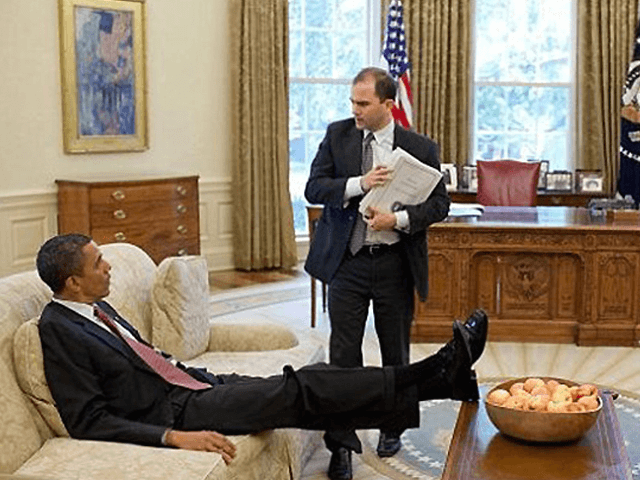Deputy national security adviser Ben Rhodes–who lacks any prior qualifications for the post–has explained to the Atlantic’s Jeffrey Goldberg at the Aspen Ideas Festival on Monday that the administration believes that a bad Iran deal is worth doing because political reform inside the Iranian regime is more likely with the deal than without. Or, to use Rhodes’s own words (see update below): “We believe that the kiss of the nuke deal will turn the Iranian frog into a handsome prince.”
A “fairy tale” analogy is appropriate indeed. Rhodes is arguing that because the worst hard-liners in the Iranian regime oppose a deal, it is better to support one. That overlooks the fact that the hard-liners and so-called reformists both share the same goals–namely, preserving the regime in its present form, where it supports terror around the world; threatens America and our allies; and brutally suppresses human rights. The idea of internal Iranian reform is a self-serving fantasy.
In the past several days, we have learned that President Barack Obama negotiated a hostage exchange with the Iranian regime in 2009, while his administration denied it. In the 1980s, a similar secret deal led to the Iran-Contra scandal, the worst moment of the Reagan presidency. Yet thanks to a supine press and a timid opposition, the Obama administration is getting away with it—and Obama is offering Iran sophisticated nuclear technology, not just a few weapons.
The Obama administration has given away every bit of leverage it once had against Iran, and is busy giving up the last, preparing to end sanctions immediately instead of after Iran has fulfilled the terms of a nuclear deal. Obama is even prepared to drop non-nuclear sanctions—those that the U.S. had in place because of Iran’s active campaign of global terrorism, including here in the United States.
He has, by his own admission, created a path for Iran to go nuclear—he simply hopes it won’t, or that by the time it will, someone else will be in power, and to take the blame.
Obama often claims that he deserves credit for unifying the world around nuclear sanctions—that when he came into office, the George W. Bush administration had left a divided world that he had to repair.
The opposite is true: Bush had achieved rare unity at the UN Security Council in support of tough sanctions that banned any nuclear enrichment at all by the Iranian regime.
When he came to office, Obama was determined to do the opposite—to prevent or delay new sanctions against Iran. The first to protest were the French, who are in closer range of Iranian ballistic missiles, and whose obsequious sensitivity to Arab concerns clued them in to regional anxieties about Iran’s goal of dominating the Middle East.
The French nearly derailed Obama’s present efforts, warning of a “sucker’s deal.” Even they, however, have bowed to the inevitable, and are busily preparing the customary flying fleets of crony socialists to set up shop in Tehran.
Israel tried to dissuade Obama from making a bad deal that would leave Iran on the threshold of nuclear “breakout,” posing a direct threat to Israel’s security and casting a shadow over its future, as it struggles with Palestinian attempts to delegitimize and destroy it. It tried everything, even appealing directly to Congress, in Prime Minister Netanyahu’s historic March address.
The problem that Netanyahu faced was the Democratic Party.
Once the more reliable pro-Israel party, Democrats have drifted to the anti-Israel far-left since the war on terror brought Bush into close alignment with Israel—philosophically, if not always practically. (Some Israeli leaders were skeptical about the Iraq War, and attacked Syria’s nuclear reactor without Bush’s green light.)
Though they have tired of him—most recently, resisting his personal appeal to approve fast-track trade authority—Democrats want to protect Obama’s legacy. It is their only real asset.
And so the deal that must now be concluded by July 7—after several extensions over a year and a half of talks—will almost certainly put Iran on a steady nuclear path. It will also give Iran up to $150 billion in sanctions relief—just when Iran’s proxy terrorist armies in Syria are near exhaustion, and Lebanese Hezbollah has admitted it is too weak to destroy Israel.
It is an historic mistake–or a deliberate gambit.
Put charitably, Obama is naïvely attempting to purchase an American exit from the Middle East at the cost of Israel’s safety—and that of other Arab allies, which have vowed to nuclearize as a result.
More darkly, Obama is attempting to create a “new equilibirum” with Iran—terrorist, tyrannical Iran—stabilizing the region.
To that end, Obama has elevated pro-regime voices to his inner circle.
And so Iran is sitting on both sides of the table, ready to sign the deal, while Rhodes tells fairy tales to the American public.
Update: The source of the quote has since clarified that Rhodes did not use those words.

COMMENTS
Please let us know if you're having issues with commenting.